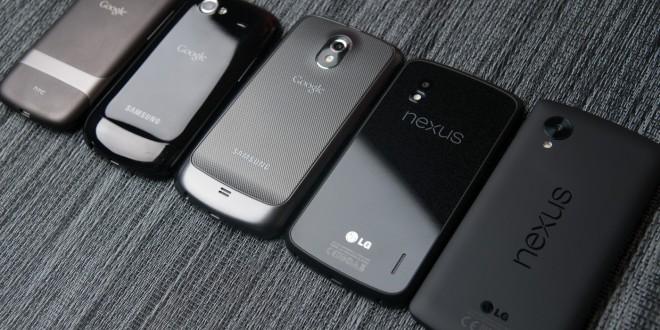
Autumn is just beginning, and already we’ve had three big flagships thrown at us within the first few days of September: the Samsung Galaxy Note 4 (and Galaxy Note Edge, so maybe four big flagships), the Motorola Moto X (2nd Gen.), and finally the Apple iPhone 6 (and 6 Plus... so that's technically five, I just can’t count). Regardless, here we are facing most of the more anticipated flagships we had hoped would release in the latter half of 2014. Still, there’s just one more phone that we’ve become accustomed to see released in autumn that still hasn’t been made quite clear whether we will even see it or not this year, and that’s the next generation Google’s Nexus device.
Rumors have run amuck all year on whether the Nexus line will continue or not. At one point it seemed almost certain that a new program from Google, called Android Silver, would replace the Nexus line. Nexus has always been popular for running a “pure” or “vanilla” Android experience, as well as being sold at full-price for cheaper than your average bear for the past few years. That being said, Nexus never quite rose to the same level of popularity that other Android flagships managed to reach. Android Silver, it seemed, was Google’s idea of a rebranding that would help Google stand a little prouder in the name of its own platform, as Android Silver was rumored to be all about premium Android smartphones.
But rumors are just rumors until confirmed, and it seems that Google might not have given up on Nexus entirely like some of us may have originally thought. Recently talks of the Nexus 6, or in some cases “Nexus X” (what is it about the letter X that makes things so much more interesting?), have resurfaced and is rumored to show up on shelves sometime in late October. There’s that keyword again, though. Rumored.
I’m hoping those rumors are true, though.
Not only am I hoping to be able to look forward to another new flagship release sometime in the near future, but I also feel like the Nexus line was just starting to take off. I realize that Nexus phones were initially designed to be a cheap and efficient tool for developers, but as we could see with the Nexus 5 last year, Nexus isn’t just for developers looking for a cheap device anymore. Google’s Nexus 5 had been praised as being “a flagship phone without the flagship price” by many tech reviewers last year, which is as good of a reason as any to at least check the phone out. You also have to take into consideration that you don’t have to mess with bloatware, or even being locked to a certain carrier as the phone is unlocked. It really is a pretty sweet deal.
So I’m thinking that if the Nexus 5 could make such a big impression on people, a Nexus 6 could probably do one better. Honestly, it’s not too hard to make a competitive flagship compared to this year’s lineup. All you need is 3GB of RAM, the latest Snapdragon chipset, skip the 16GB of internal memory and start off with 32GB (and offer an alternative 64GB option) and a microSD card slot, at least a 13-megapixel camera, at least a 5-inch QHD display, and voila. Recipe for instant success, so long as the price tag manages to stay below $400. I know, I know - no flagship is likely to actually beat out every other flagship on the market and still manage to keep a cheap price tag, but if anybody can manage to do it, it would be Google. It's probably easier said than done, of course, but even including just some of those qualities could put the Nexus 6 right up there.
If a Nexus 6 is not to come to fruition this year, or ever, I do wonder how Android Silver will play out. I don’t think the Nexus line is ready for retirement just yet, because as I mentioned before, it seems like the line is just now really picking up speed. I suppose time will only tell if a new Nexus is in the cards for us this year or not, but here’s hoping.